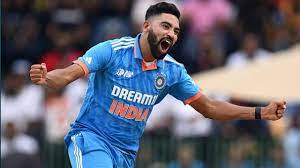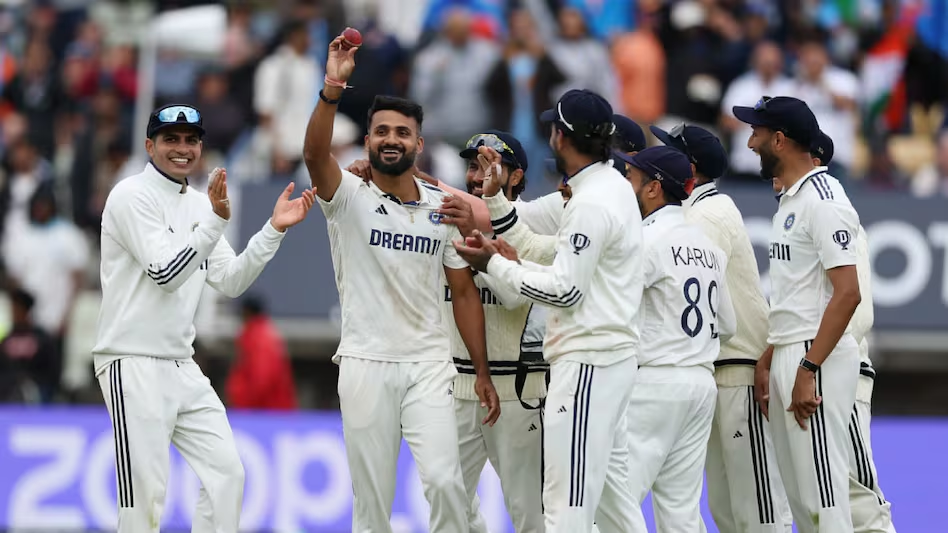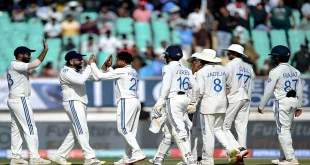Asia Cup: Asia Cup (Asia Cup) 2023 will be remembered for records. India won the Asia Cup trophy for the record 8th time by defeating Sri Lanka in 37 balls. In front of the strong bowling of the Indian bowlers led by Mohammed Siraj, the Sri Lankan team collapsed for 50 runs in the final. India set many records by achieving the target in 6.1 overs without losing any wicket. The Asia Cup 2023 final will be remembered forever. Because everything happened in the final which no one had expected. There was a shower of records.
Fast bowler Mohammad Siraj bowled havoc and took 6 wickets for 21 runs in 7 overs. Sri Lankan batsmen had to face another storm in the form of Siraj. In front of his bowling, Sri Lankan team was 15. Could last only 2 overs, which was his second lowest score in ODI against India. This is only the second time in the history of Asia Cup ODI that all 10 wickets were taken by fast bowlers. In the current Asia Cup, Pakistan’s fast bowlers had achieved this feat against India. This match could not be completed due to rain.
On the basis of his excellent bowling, Siraj became the fourth bowler in the history of ODI to take 4 wickets in 1 over. He also equaled the record of former Sri Lankan fast bowler Chaminda Vaas of taking 5 wickets in the fastest innings in ODI cricket. Siraj completed 50 wickets in ODI in this match. He bowled 1002 balls to reach this milestone. In this format, he has become the second bowler to take 50 wickets in the fewest balls. The record is in the name of Sri Lanka’s Ajantha Mendis (847 balls).
The Asia Cup final match between India and Sri Lanka ended within 129 balls. This is the third match to end in the fewest number of balls in the history of One Day International cricket. Earlier, the ODI played between Nepal and America in the year 2020 ended within just 104 balls, while the ODI played between Sri Lanka and Zimbabwe in the year 2001 ended within 120 balls. After this comes the match between India vs Sri Lanka. Siraj’s performance is the best performance by a fast bowler from India in an ODI final. This is the second best performance of an Indian bowler in the ODI final. Anil Kumble took six wickets for 12 runs in the final of Hero in 1993.
India won the final match against Sri Lanka with 263 balls remaining. This is the biggest win of any team in terms of balls in the ODI final. Earlier this record was in the name of Australia, which had won with 226 balls remaining in Sydney in 2003. Sri Lanka’s score at the fall of the fifth wicket was 12 runs, which was its minimum score against India at this stage. On this score, he lost his sixth wicket, which is the lowest score of a full-time ICC member country at this stage in ODIs.
India defeated Sri Lanka by 10 wickets in the Asia Cup final. Earlier, India had defeated Zimbabwe by 10 wickets in the ODI final in 1998, while in 2003, Australia had defeated England by 10 wickets. India has become the first team to win the ODI final by 10 wickets on two occasions. It defeated Zimbabwe by 10 wickets in Sharjah in 1998.
India has captured the Asia Cup trophy for a record eighth time. Team India is the team that has won the Asia Cup the most number of times. Sri Lanka is at second place in this list, which has won the Asia Cup title overall six times.
Opener Shubman Gill topped in terms of scoring most runs in the Asia Cup. 24 year old Gill created history by scoring a total of 302 runs while Rohit Sharma scored 194 runs.
Rohit Sharma has become the third Indian captain to win the Asia Cup twice. Earlier, under the captaincy of Mohammad Azharuddin and Mahendra Singh Dhoni, India had captured the Asia Cup trophy twice. Under the captaincy of Mahi, India has won the trophy once in T20 format and once in ODI format.
Sri Lankan team was all out on total score of 50 runs. This is the lowest score of any team against India in the history of One Day International cricket. Earlier in 2014, Sri Lankan team was defeated in Mirpur ODI on the score of 58 runs.
Mohammad Siraj has become the first bowler for India to take 6 wickets in the Asia Cup final. Siraj has become the first bowler for India to take four wickets in an over in ODI cricket. He is the second bowler after Ashish Nehra to take 6 wickets against Sri Lanka.
 Indian Thought Latest News & Views
Indian Thought Latest News & Views



